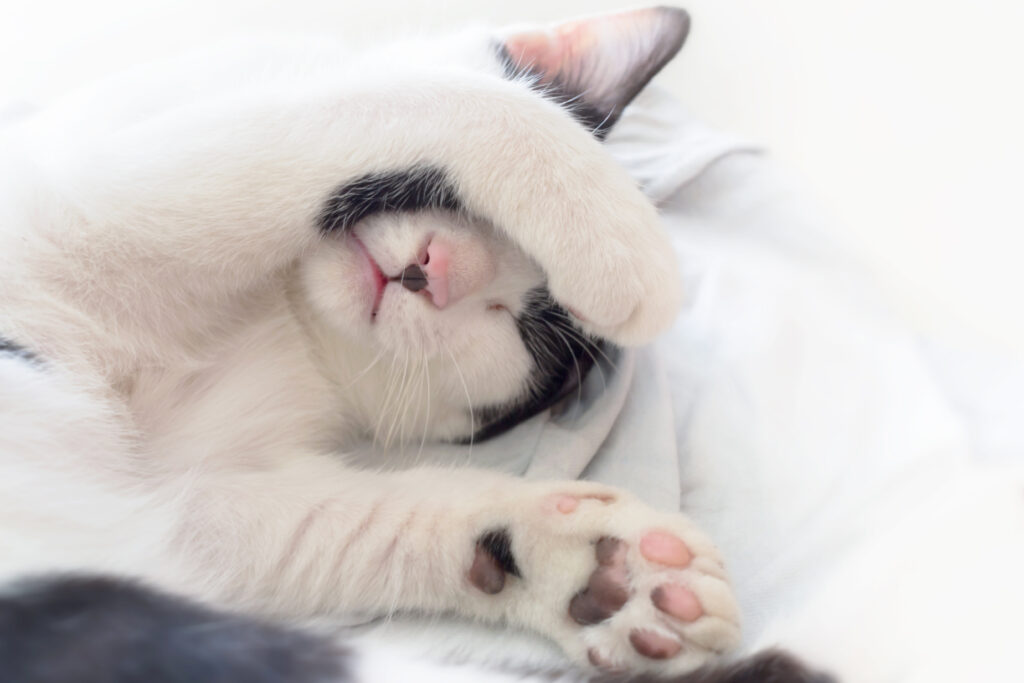The holidays are over, but the lavish food and treats still make you feel a little sluggish. Our pets often feel the same way when they have had a few extra treats. However, pet owners like to downplay or overlook the first signs of being slightly overweight. Unless it is addressed soon, it can cause further problems and reduced energy. This is how pet owners can get their pets back to a normal weight.
Organ steatosis (especially of the liver), cardiovascular anomalies, diseases of the entire musculoskeletal system and diabetes can result from your pet being overweight and lead to reduced energy and more problems in the animal’s body. Constantly increased sugar consumption due to too many treats and the wrong food, as well as increased weight and stress on the joints, leads to the formation of arthrosis. In significantly overweight animals, the fat also presses on the heart, which causes shortness of breath. Especially in brachycephalic, i.e. short-nosed breeds, where breathing is difficult anyway, their quality and length of life can be hugely impaired. This is especially true on summer days with high temperatures.
Ways of increasing energy: fat vs. carbohydrates
Your pet needs fat to generate energy and maintain all its metabolic processes. However, as the name suggests, low-fat feed provides less fat and fewer calories. It is now widely known that consuming too many carbohydrates causes obesity. Fat, on the other hand, serves to cover energy needs and compared to carbohydrates provides twice as much energy for the same amount Most diet foods use carbohydrates to keep blood sugar levels steady and prevent energy slumps. However, carbohydrates cause constant fluctuations in the blood sugar level, leading to hunger attacks.

A high dose of indigestible fibre should also [should there be a ‘not’ here??] be the solution for a quick feeling of fullness. This is inadvisable over the long term as high levels of indigestible fibre lead to very bulky and mushy stools and increased flatulence. It also impedes the absorption of nutrients. In such cases, your pet will sooner or later need to see a vet, who will determine elevated liver values.
The solution: boosting the metabolism
Although diet foods appear to be a simple and well-intentioned solution, in most cases the reduced calorie content does not achieve the desired weight loss. Tackling an already slow metabolism with even more reductions is the wrong approach. Since waste products can no longer be removed from the animal’s body due to the energy deficit, this must be stimulated as well as the lymph flow. This is the only way to avoid deficiency symptoms and tiredness.
Pet weight loss tips:
First of all, your pet’s current food intake should be examined closely, its individual components analysed and the amount checked if necessary. Treats must be taken into account. High-quality ingredients sources of protein and fat must be the priority. A reliable guide for the amount of food is 2% of the animal’s body weight. Individual feed advice can also be helpful.
The following tips are useful:
- Omit carbohydrates from your pet’s food
- Carry out a colon cleanse: Overweight animals usually have disturbed intestinal flora, which can contribute to weight gain. Specific intestinal bacteria are required to bring the intestinal flora back into balance.
- More exercise in the fresh air or active play.
- Addition of vitamins, such as vitamin C or D (particular care should be taken with the dosage of vitamin D. It is advisable to consult your vet to avoid overdosing on this fat-soluble vitamin.
- Weight loss should be carried out slowly! (More gradual weight loss is healthier and more sensible than short-term weight reduction.)
The internal organs, including the detoxification organs (liver and kidneys), should be stimulated and strengthened, as they automatically stimulate the metabolism and provide more energy. This can be done very easily with plant-based combination preparations. Proven herbs include:
- Milk thistle: It is one of the most important medicinal plants for the liver because it supports and stimulates liver cell regeneration. Silymarin is the most important ingredient because it has a strong antioxidant effect.
- Artichoke: The active ingredients in artichoke protect and strengthen the liver. Cynarin stimulates the liver and gall bladder and promotes their detoxification and blood circulation.
- Spirulina algae Spirulina contains every essential amino acid and has a protein content of around 60-70%, making it a real protein and nutrient bomb. The algae is very rich in chlorophyll, all fat-soluble vitamins ( vitamins A, D, E and K), all B vitamins and especially B12, beta-carotene, iron and magnesium.
- Horsetail : It has a diuretic and draining effect on the urogenital area. It owes its diuretic effect to minerals, especially potassium salts, as well as flavonoids and saponins.
- Teasel: Teasel root is one of the best substances for strengthening kidney and liver Qi. It has antibacterial and blood-cleansing properties and reduces joint and muscle pain, skin problems, diarrhoea and gall bladder weakness.

